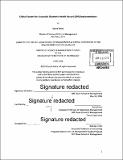Critical factors for successful electronic health record (EHR) implementation
Author(s)
Barry, Sacha. (Sacha M.)
DownloadFull printable version (5.417Mb)
Alternative title
Critical factors for successful EHR implementation
Other Contributors
Sloan School of Management.
Advisor
Retsef Levi.
Terms of use
Metadata
Show full item recordAbstract
Since the 1970s, the healthcare industry has been moving from paper-based documents towards computer information systems in an effort to increase timely access to quality information, with the ultimate objective of wide dissemination and adoption of Electronic Health Records (EHRs). EHRs are electronic collections of patient health information that are recorded by physicians, nurses and patients themselves, before being approved by physicians and shared across diverse settings. EHR implementation can improve care quality and efficiency and physician productivity and reduce healthcare costs. However, implementation often proves to be difficult. This paper reviews several common issues associated with EHR adoption including negative impacts on quality of care, physicians' productivity, patients' safety and organizations' financials from high maintenance and implementation costs. It then summarizes critical success factors found in the literature. It eventually examines two cases studies of Enterprise Resource Planning (ERP) implementation in the automotive and food and beverage industries and leverages ERP implementation best practices to develop a practical framework for successful HER adoption. Hopefully, it will be useful for future EHR adoption projects in the U.S. and other regions of the world.
Description
Thesis: S.M. in Management Studies, Massachusetts Institute of Technology, Sloan School of Management, 2016. Cataloged from PDF version of thesis. Includes bibliographical references (pages 68-75).
Date issued
2016Department
Sloan School of ManagementPublisher
Massachusetts Institute of Technology
Keywords
Sloan School of Management.